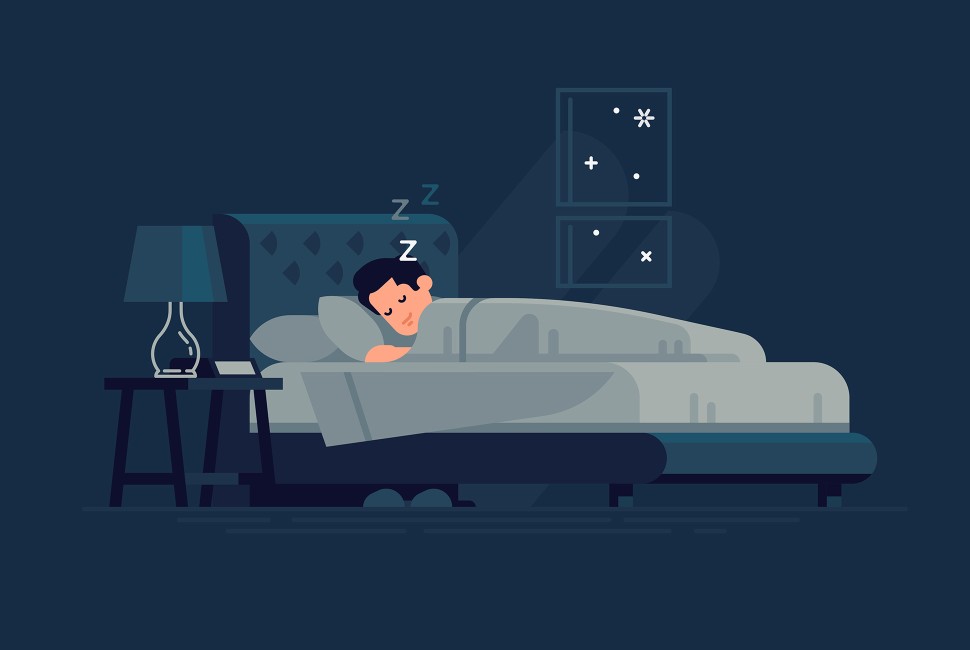Table of Contents
Introduction
Why do we sleep, and why is it so important?
Excellent Book to read on Sleep “Why We Sleep”
Sleep is a fundamental aspect of our lives, yet many of us struggle to get the quality and quantity of sleep we need.
In our modern lives, the importance of quality sleep is often overlooked.
It is easy to overlook the importance of sleep. Sleep is crucial for our physical and mental well-being.
In this blog post, you will explore the fascinating world of sleep, including the latest research, common sleep disorders, and tips to improve your sleep quality.
The Importance of Sleep
Sleep is not just a passive state of rest, but an active process that is essential for our overall health and well-being. During sleep, our bodies and minds undergo a series of critical processes that are vital for our physical and cognitive function.
The Science of Sleep
To fully understand the importance of sleep, it is essential to explore the different stages of the sleep cycle. There are two main types of sleep: non-REM (NREM) sleep and rapid eye movement (REM) sleep
There are three stages of NREM Sleep
- Stage 1: This is the lightest stage of sleep, where you are still easily awakened and may experience brief periods of muscle twitches or sudden jerks.
- Stage 2: During this stage, your brain activity slows and your body temperature drops as you enter a deeper state of sleep.
- Stage 3: Also known as “slow-wave sleep,” this is the deepest and most restorative stage of
NREM sleep . It is during this stage that your body repairs and regenerates tissues, boosts immune function, and consolidates memories.
During the deep sleep stages, our bodies undergo the most significant physical restoration.
- Tissue Repair:
The body releases growth hormones that facilitate tissue repair, muscle growth, and bone building. - Immune Function: Sleep plays a crucial role in regulating the immune system, with deep sleep stages supporting the production of cytokines, proteins that help fight off infections and inflammation.
- Metabolic Regulation: Adequate deep sleep is essential for maintaining healthy metabolic function, including glucose regulation and appetite control.
The different stages of sleep work together to provide the restorative benefits we need.
By understanding the science behind these sleep stages, you can better appreciate the importance of getting quality, uninterrupted sleep.
Common Sleep Disorders
A.
B. Sleep
C.
Here are some of the therapies used for RLS:
1. Lifestyle Changes:
- Regular Exercise: Engaging in moderate exercise regularly can help alleviate RLS
symptoms. - Avoiding Triggers: Identifying and avoiding triggers such as caffeine, nicotine, and certain medications that may worsen symptoms can be beneficial.
- Good Sleep Habits: Maintaining a regular sleep schedule and creating a sleep-friendly environment.
2. Medications:
Dopamine Agonists : Medications that mimic the effects ofdopamine , a neurotransmitter involved in movement control, are often prescribed to manage RLS. Gabapentin : Thisanticonvulsant medication may be prescribed to help reduce symptoms and improve sleep quality.Benzodiazepines : In some cases, short-term use ofbenzodiazepines may be recommended to relieve symptoms and aid sleep, but they are generally not the first-line treatment due to potential side effects and dependency risks.
3. Iron Supplements: In cases where RLS
4. Other therapies:
- Massage and Stretching: Gentle massage and stretching exercises before bedtime may provide temporary relief.
- Heat or Cold Therapy: Applying heat or cold packs to the affected limbs can help reduce discomfort.
Transcutaneous Electrical Nerve Stimulation (TENS ): This therapy involves applying mild electrical currents to the affected area to relieve symptoms.
It is important to remember that treatment options may vary depending on the severity of symptoms and individual circumstances. If you suspect you have
D.
The Consequences of Sleep Deprivation
Unfortunately, most people do not get enough sleep.
Insufficient sleep can lead to chronic illnesses due to various factors, including:
- Hormonal Imbalance: Lack of sleep can disrupt the body’s hormonal balance, potentially leading to elevated cortisol levels, the stress hormone. Research indicates that sleep deprivation impacts the appetite-regulating hormones leptin and ghrelin. Insufficient sleep reduces leptin levels, which signal fullness to the brain, thus lower levels may result in heightened hunger and appetite. On the other hand, sleep deprivation raises ghrelin levels, the hormone responsible for stimulating appetite, making one feel more hungry.
- Inflammation:
Lack of sleep triggers an inflammatory response. Chronic inflammation is associated with a range of health problems, including heart disease,stroke ,diabetes , and certain types of cancer. - Impaired Glucose Metabolism: Insufficient sleep affects the body’s ability to regulate blood sugar levels properly. It can lead to
insulin resistance , reduced glucose tolerance, and an increased risk of developingtype 2 diabetes . It can also contribute to weight gain, which increases the risk of metabolic disorders. - Cardiovascular Health: Chronic sleep deprivation has been linked to an increased risk of hypertension (high blood pressure), heart disease, and
stroke . - Weakened Immune System: Sleep is essential for a well-functioning immune system. During sleep, the body repairs and strengthens its defences. Chronic sleep deprivation compromises the immune response, making individuals more susceptible to infections, viruses, and other illnesses.
- Mental Health Disorders:
Lack of sleep can contribute to the development or exacerbation of mental health conditions such as anxiety and depression. Itimpairs emotional regulation , increases feelings of stress and irritability, and disrupts the balance of neurotransmitters involved in mood regulation. - Accelerated Ageing: Research suggests that chronic sleep deprivation may accelerate the ageing process by increasing inflammation, oxidative stress, and cellular damage.
- Disrupted Circadian Rhythm: The body’s internal clock, or circadian rhythm, controls biological processes like sleep-wake cycles, hormone secretion, and metabolism. Chronic sleep deprivation can disrupt this rhythm, affecting these processes. This disruption is linked to higher risks of metabolic, cardiovascular, and mood disorders.
- Increased Stress Response:
Lack of sleep can contribute to increased stress levels both physically and psychologically. An elevated stress response can lead to increased inflammation,elevated blood pressure , and an increased risk of developing cardiovascular disease.
It is important to note that chronic diseases are complex and multifactorial, and sleep deprivation is one of the many contributing factors. However, prioritising adequate and restorative sleep is crucial for overall health and for reducing the risk of chronic diseases.

Physical Health Benefits of Sleep
- Immune System Boost: Sleep plays a crucial role in supporting the immune system. During sleep, our bodies produce and regulate important immune cells, such as T-cells and natural killer cells, which help fight infections and diseases.
- Cardiovascular Health: Adequate sleep is associated with a lower risk of heart disease, stroke, and high blood pressure. Sleep helps to regulate blood pressure, cholesterol levels, and inflammation, all of which are important for cardiovascular health.
- Metabolic Regulation: Sleep is essential for maintaining a healthy metabolism.
Lack of it can disrupthormones that regulate appetite, leading to weight gain and an increased risk oftype 2 diabetes .
Mental Health Benefits of Sleep
- Cognitive Function: Sleep is crucial for optimal brain performance. During sleep, the brain consolidates memories, processes information, and facilitates learning.
Lack of sleep can impair our ability to focus, problem-solve, and make decisions. - Emotional Regulation: Sleep plays a crucial role in emotion regulation. During sleep, our brains process and consolidate emotional experiences, helping us better manage stress, anxiety, and mood disorders.
- Creativity and Productivity: Sufficient sleep is associated with enhanced creativity and productivity. When we are well rested, our brains are more capable of producing fresh ideas, tackling intricate problems, and addressing tasks from a different perspective.
Even with other healthy habits, inadequate or poor sleep quality can pose a risk for cardiovascular diseases. There are several reasons why sleep is important for cardiovascular health.
- During sleep, blood pressure decreases, allowing the cardiovascular system to rest and recover. Consistently experiencing poor sleep may prevent this natural dip in blood pressure, resulting in sustained higher levels. Elevated blood pressure is a significant risk factor for various cardiovascular diseases.
- Inflammation and Immune Function: Sleep plays a crucial role in regulating inflammation and supporting a healthy immune system. Disrupted sleep patterns can lead to chronic low-grade inflammation, which can contribute to the development and progression of cardiovascular diseases.
- Inflammation: Chronic stress can trigger low-grade inflammation in the body. Elevated levels of stress
hormones can promote the release of pro-inflammatory molecules, leading to increased inflammation within the blood vessels. Chronic inflammation may contribute to the progression of atherosclerosis and raise the risk of cardiovascular events like heart attack or stroke. - Metabolic Health: Inadequate sleep can disrupt hormonal regulation, leading to imbalances in
insulin and glucose metabolisms. These disruptions can increase the risk of developing conditions, such asobesity ,diabetes , andmetabolic syndrome , all of which are associated with a higher risk of cardiovascular diseases. - Stress Response:
Poor sleep can activate the body’s stress response, leading to increased production of stress hormones , such ascortisol . Chronic elevation of stresshormones can have detrimental effects on the cardiovascular system, includingelevated blood pressure and inflammation. Theycan cause blood vessels to constrict, leading to increased resistance to blood flow and a subsequent increase in blood pressure. Prolonged elevation of blood pressure can damage arterial walls which increases the risk of atherosclerosis (plaque buildup), and contributes to the development of cardiovascular diseases. - Changes in Blood Lipid Levels: Chronic stress can affect lipid metabolism and lead to unfavourable changes in blood lipid levels. It may increase
low-density lipoprotein (LDL )cholesterol , often referred to as “bad”cholesterol , and decreasehigh-density lipoprotein (HDL )cholesterol , known as “good”cholesterol . These lipid imbalances contribute to the development ofatherosclerosis and cardiovascular diseases. - Impaired Blood Clotting: Stress
hormones can affect the body’s ability to regulate blood clotting. They can increase the production of certainclotting factors while decreasing the production of others, potentially leading to an imbalance in the blood-clotting process. This promotes ahypercoagulable state and increased clotting risk, which can cause cardiovascular events such as heart attacks orstrokes . Autonomic Nervous System Imbalance: Sleep is closely connected to the autonomic nervous system, which regulates functions such asheart rate , blood pressure, and vascular tone. Sleep disturbances can cause an imbalance in the autonomic nervous system, promotingsympathetic overactivity (the fight-or-flight response) and hindering the ability to effectively regulate cardiovascular function.
It is important to emphasise that cardiovascular health is multifactorial, and the interplay between various lifestyle factors is crucial. While exercising, maintaining a healthy diet, and other lifestyle changes are important, ensuring adequate and restorative sleep is vital for overall cardiovascular well-being.
If you have concerns about chronic stress and its effects on your cardiovascular system, consult with a healthcare professional who can provide help.
Sleep and the microbiome
The microbiome refers to the vast community of microorganisms (such as bacteria, viruses, fungi, and other microbes) that reside within and on our bodies, particularly in our gut. Emerging research suggests that sleep can influence the composition and function of the microbiome, which in turn may impact sleep.
- Sleep and Microbiome Composition: Studies have shown that sleep patterns, including sleep duration and quality, can affect the diversity and abundance of microbial species in the gut. Disruptions in sleep have been associated with alterations in gut microbiome composition, leading to a less diverse and potentially less healthy microbial community.
- Gut-Brain Axis: The gut and brain are connected through what is known as the gut-brain axis. The gut microbiome communicates bidirectionally with the brain through various pathways, including the nervous system and chemical signalling pathways. Sleep disturbances can disrupt this communication, affecting the balance of the gut microbiome and potentially influencing mental health and cognitive function.
- Circadian Rhythm: Sleep is closely tied to the internal circadian rhythm, which regulates various physiological processes in the body. The gut microbiome also exhibits diurnal variations and is influenced by circadian rhythm. Disruptions in the sleep-wake cycle, such as shift work or jet lag, can disrupt the circadian rhythm of the gut microbiome, impacting its composition and function.
- Metabolic Health: The gut microbiome plays a vital role in metabolism and can influence energy balance, nutrient absorption, and inflammation. Sleep disturbances have been linked to metabolic disturbances, including changes in glucose metabolism,
insulin resistance , andobesity . Alterations in the composition and function of the gut microbiome may contribute to these metabolic changes. - Immune Function: Both sleep and the gut microbiome have significant effects on immune function.
Poor sleep quality can weaken the immune system, making individuals more susceptible to infection and inflammation. The gut microbiome plays a crucial role in immune modulation. Imbalances in the gut microbiome influenced by sleep disturbances may affect immune function and increase the risk of immune-related disorders.
Although the relationship between sleep and the microbiome is an exciting area of research, it is important to note that the exact mechanisms and causality are still being explored.
Factors such as diet, stress, and other lifestyle factors can also influence both sleep and the microbiome. Further research is needed to better understand the complex interactions between sleep and the microbiome.

How to Improve sleep
- Establish a Relaxing Bedtime Routine: Develop a relaxing bedtime routine to signal to your body that it is time to unwind and prepare for sleep. This may include activities such as reading a book, taking a warm bath, practicing relaxation techniques, or listening to calming music.
- Stick to a Consistent Sleep Schedule: Establish a regular sleep-wake schedule by going to bed and waking up at the same time, even on weekends. This helps to regulate the body’s internal clock and promotes better sleep quality.
- Keep your bedroom dedicated to sleep and relaxation. Try to avoid using your bedroom for work, studying, or other stimulating activities. By associating your bedroom solely with sleep and relaxation, you can train your mind to recognise it as a place of rest.
- Create a Sleep-Friendly Environment: Make your bedroom a sleep-friendly environment by keeping it cool, dark, and quiet. Use curtains or blinds to block external light, wear earplugs to reduce noise disturbances and maintain a comfortable temperature for sleep.
- Comfortable Bedding: Invest in high-quality, comfortable bedding that suits your preferences. Choose soft, breathable sheets and cosy blankets or comforters that provide the right level of warmth. The tactile comfort of your bedding can enhance your overall relaxation experience.
- Invest in a supportive mattress and pillow. A quality mattress that provides adequate support for your body can make a significant difference in your sleep quality. Similarly, choose a pillow that suits your preferred sleeping position and provides optimal neck and head support.
- Choose Calming Colours: Consider using calming colours such as soft blues or neutral tones in your bedroom decor. Avoid stimulating or vibrant colours that can hinder relaxation. Keep the overall ambiance soothing and clutter-free.
- Limit Exposure to Electronic Devices: Avoid using electronic devices such as smartphones, laptops, or tablets before bedtime. The blue light emitted by these devices can interfere with the production of
melatonin , which is ahormone that regulates sleep. If you must have electronics in the bedroom, consider using apps or settings that reduce blue-light emission, or use dimmer settings in the evening. - Dimmable Lighting: Install dimmer switches or lamps with adjustable brightness to control lighting in the bedroom. Soft, warm lighting in the evening can signal the body to wind down and prepare for sleep. Avoid bright and harsh lighting that can interfere with
melatonin production. - Soundproofing: If external noises disrupt your sleep, consider soundproofing your bedroom. Soundproof curtains, rugs, and acoustic panels can help reduce external noise.
- Natural Elements: Incorporate natural elements into the bedroom decor. Indoor plants can improve the air quality and create a soothing environment. Additionally, natural materials like wooden furniture or natural fibres for rugs and curtains can enhance the overall sense of tranquillity.
- Avoid Stimulants and Heavy Meals: Limit your consumption of stimulants such as caffeine and nicotine, especially in the evening, as they can interfere with your ability to fall asleep. Caffeine has a multitude of effects on the brain and body but the most relevant culprit for affecting quality sleep is its effect on blocking
adenosine .Adenosine is a molecule found naturally in the body that binds to receptors in the brain. When this happens naturally we begin to feel tired. Caffeine is also a molecule that has a similar shape asadenosine and, when consumed, blocks the adenosine from finding its receptor. Additionally, avoid heavy meals, spicy foods, and excessive fluid intake close to bedtime to prevent discomfort and disruptive nigh-time awakenings. - Declutter and simplify: Keep your bedroom clean, organised, and free of clutter. A clutter-free space promotes a sense of calm and reduces distractions. Remove unnecessary items from your bedroom and create a minimalistic environment that promotes relaxation.
- Scented Candles or Essential Oils: Utilise scents that have calming properties to create a peaceful atmosphere. Light scented candles, essential oil diffusers, or place sachets with sleep-inducing scents like lavender or chamomile in your bedroom. The gentle aroma can help relax your mind and body.
- Regular Exercise: Engage in regular physical activity, but try to avoid vigorous exercise close to bedtime, as it can stimulate your body and make it difficult to fall asleep. Aim for moderate-intensity exercise earlier in the day to promote better sleep.
- Limit Napping: If you have trouble falling asleep at night, try to limit daytime napping or keep it to short power naps that don’t exceed 20–30 minutes. Long or late afternoon naps can disrupt your sleep-wake cycle.
- Manage Stress and Worry: Practice stress management techniques, such as relaxation exercises, meditation,
mindfulness , or journaling, to help calm your mind before bed. If you find yourself worrying or ruminating at night, consider setting aside dedicated “worry time” earlier in the day to address any concerns.
There are several relaxation techniques that can help calm your mind and body before bed, preparing you for a restful sleep. The following are a few techniques that can be incorporated into your pre-sleep routine:
Progressive Muscle Relaxation (PMR ):PMR involves systematically tensing and relaxing each muscle group in your body. Start from your toes and work your way up to your head, gradually releasing tension as you go. This technique promotes physical relaxation and alleviates muscle tension and anxiety.- Deep Breathing Exercises: Deep breathing exercises are simple yet effective in reducing stress and promoting relaxation. Find a comfortable position, close your eyes, and take slow, deep breaths. Inhale deeply through your nose, allowing your abdomen to rise, and exhale slowly through your mouth, focusing on releasing any tension.
- Guided Imagery or Visualisation: Guided imagery involves creating a mental image or scene that promotes relaxation and tranquillity. You can use pre-recorded guided imagery sessions or simply visualise a peaceful place of your choice, such as a serene beach or a calming forest. Engage your senses, imagining the sights, sounds, and smells of the environment.
- Meditation: Meditation is a practice that cultivates
mindfulness and helps quiet one’s mind. Find a quiet space, sit comfortably, and focus on your breath, a specific object, or a mantra. Allow your thoughts to come and go without judgement, gently redirecting your attention back to your chosen focus point. Meditation can help reduce stress and anxiety, and promote a sense of calm before sleep. Progressive Relaxation Music or Nature Sounds: Listening to calming music or nature sounds can create a soothing atmosphere conducive to sleep. Look for soft instrumental music, natural sounds such as rain or ocean waves, or specially designed sleep-inducing audio tracks that can help relax one’s mind and prepare one for sleep.- Aromatherapy: Certain scents, such as lavender, chamomile, or vanilla, have calming properties that can promote relaxation. Consider using essential oils, candles, or a sachet with a sleep-inducing scent in the bedroom to create a relaxed environment.
If you find yourself lying awake worrying, get up and engage in a relaxing activity until you feel sleepy.
Remember, the key is to find relaxation techniques that work best for you. Experiment with different methods and incorporate them into your pre-sleep routine to help signal to your body and mind that it is time to wind down and prepare for a restful sleep.
Remember, these are general tips, and it is always essential to consult with a healthcare professional or sleep specialist for personalised advice if you are experiencing chronic sleep issues or have specific concerns about your sleep health.
Debunking Sleep Myths
Despite the overwhelming evidence of the importance of sleep, there are still many myths and misconceptions surrounding this vital aspect of our lives. Let us explore some of the most common sleep myths and the truth behind them:
Myth 1: “I can get by on 5–6 hours of sleep per night.”
The truth is that most adults need 7-9 hours of sleep per night to function optimally. While some individuals may be able to function with less sleep, the majority of people require at least seven hours of sleep to maintain good physical and mental health.
Myth 2: “Sleeping in on the weekends can make up for a lack of sleep during the week.”
While catching up on sleep on the weekends can help, it is not a long-term solution. The effects of chronic sleep deprivation cannot be fully reversed by occasional longer sleep periods. Consistent, quality sleep is essential for our overall well-being.
Myth 3: “Napping is a sign of laziness.”
Contrary to this myth, napping can be a valuable tool for improving cognitive function, mood, and overall health. Short power naps of 20–30 minutes can provide a much-needed boost in energy and focus without disrupting your nighttime sleep.
Myth 4: “Alcohol helps you sleep better.”
While alcohol may help you fall asleep faster, it can disrupt the quality of your sleep. Alcohol interferes with the natural sleep cycles and can lead to fragmented and less restorative sleep.
Conclusion
In conclusion, sleep is a fundamental pillar of our health and well-being. Understanding the science of sleep, recognising common sleep disorders, and implementing tips for improving sleep quality are essential steps towards achieving restorative and rejuvenating sleep. By prioritising sleep, we can enhance our physical and mental health, improve cognitive function, and lead happier and healthier lives.
Investing in quality sleep is an investment in overall health and quality of life.
This article is not intended to replace professional medical advice. If you have specific health concerns or conditions, consult with a healthcare professional for personalised guidance.
Disclaimer: The information provided in this article is for educational purposes only and should not be considered medical advice.



